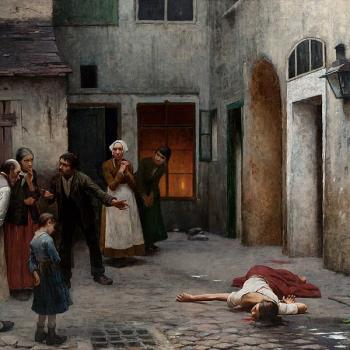In America, almost nobody has read the Constitution.
But …
Everybody is a Supreme Court justice.
Americans tend to regard the Constitution in much the same way they do God: As a true and absolute reflection of themselves. Americans think that God is made in their image, and they also think that their Constitutional rights are exactly what they want them to be. They include in this, oddly enough, the fact that those Constitutional rights do not belong to other Americans, but to them, or at most, their group, alone.
This willingness to abrogate the rights of other people on the basis of self-serving and entirely bogus Constitutionality is not only false, it is of fairly recent origin. It is also concentrated in the arguments of a few groups of people that I call (paraphrasing Mary Ann Glendon) “rights talkers.”
I don’t remember reading anything Martin Luther King, Jr ever said that implied that the Constitution did not apply to white people, native Americans, or anyone, for that matter. His arguments were based on the idea that the Gospels of Christ, the Declaration of Independence and the Constitution applied to everyone.
His method of arguing his case elevated the debate of this whole nation. He made us better people by what he said and what he did.
But Martin Luther King was a great man and a Christian man who found his primary and basic claim to the humanity of all people first and foremost in the Gospels of Christ.
That is a transcendent difference between him and the rights talkers of today.
I think the change began with abortion.
There is no possible way that anyone can argue for the “right” to commit wholesale slaughter against a whole class of people without totally nullifying the basis of Martin Luther King’s arguments. His call for equality was based on a deep understanding of the essential equality of all humanity, created as it is in the image and likeness of God, and endowed, as our founding documents say, by that Creator with certain unalienable rights. Abortion on demand does away with that premise as an arguable point.
There can be no equality of human beings if some human beings are not even considered worthy of having a basic right to life.
The debate about legalized abortion opened the doorway for the bastardization of the basic principles on which this country stands. It was but a short step after that to begin redefining the freedoms we have always regarded as belonging universally to all Americans in new, selective and narrowed ways.
People who try to argue for human rights without access to the foundation of all human rights, which is our profound equality before God, end up discriminating. They very quickly begin to advocate for practices which are not only discriminatory, but are flat-out tyrannical.
Since the types of things and the manner of debate that is employed by these people almost by definition puts them at odds with the Christian ethos of the equality of humanity, they also put them at odds with Christians, themselves. Abortion, the killing of unborn infants, is anathema to Christians who have from the beginning of the faith stood against human sacrifice of all types, including the practices of abandoning and exposing unwanted infants.
The split in our civil society began when that civil society departed from its roots to enter into the violent discrimination against an entire class of human beings by defining them as non-humans who may be killed with impunity. Those who adhered to this logic sheared themselves loose from the moorings of American society.
As their various “rights movements” took shape, they were always rooted in other soil than the great American enterprise of freedom and equality for all humanity.
For two hundred years this idea of freedom and equality had marched forward, expanding as it went. The founding fathers made tortured accommodations to slavery which could not stand. We fought a great civil war over slavery in particular, and the principles in the ideas on which this country was founded in general. Women, half the people, used the freedoms in the Constitution and the arguments in the Gospels to gain voting rights for themselves. Martin Luther King based an ultimately successful case with the American people for an end to segregation on them.
But these new “rights” movements of the last quarter of the 20th century and now into the 21st century cut themselves loose from the essential American logic at abortion. All people were no longer created equal in their way of measuring such things. And they certainly were not endowed by their Creator with certain rights such as the right to life, liberty and the pursuit of happiness.
Clearly, in the logic of those who follow abortion, not everyone is entitled to the same rights. More to the point, this iron wall of the God of Gospels on Whom such ideas of the universal equality of all humanity are based, must be taken down, by force if necessary.
It was, and it is, either Jesus Christ or their right to kill with impunity. The two cannot coexist.
What has grown out of this ethos is a deadly rhetorical stew of bad ideas and bastardized Constitutionalism that seeks to apply the bill of rights to those who hold certain ideas and to withdraw those rights from those who disagree with them.
Traditional Christianity as it has been taught and practiced for 2,000 years can not and will not bend on questions that strike to the heart of what we are. The question of who is human is simple in Christianity. We are all human. The question of who matters is equally simple. We all matter.
No group that agitates for their “rights” need look further than that for their arguments.
However, if the definition of those “rights” begins to tamper with the essential question of who a human is in ways that deny the basic moral structure of functioning humanity, then they no longer have access to the Gospels as their support. That is what has happened in contemporary America.
The result has been that we find claims to “rights” that do not exist, either in the Gospels, or the Constitution. These so-called “rights” are not “rights” at all, but rather a limitation of the Constitutional guarantees found in the First Amendment.
Suddenly, we are faced with people who use rhetorical film-flam phrases which align in sound but not meaning to American values and freedoms to claim that Christians do not have the same rights that other Americans enjoy. Christians who engage the larger culture by use of free speech, freedom of assembly and the right to petition their government are accused of attempting to “force their religion on others.”
Christians who work together in groups, which is a clearly guaranteed Constitutional right used by every “rights talker” who is attacking them for doing it, are suddenly accused of violating “separation of church and state” and threatened with the tax man bogeyman.
At the same time, any “rights talker” group whose 501c3 status was challenged would yell about their “rights” and “freedoms.”
The question becomes do Christians have the same rights as other citizens?
Do Christians have the right to free assembly? Do Christians have the right to free speech? Do Christians have the right to petition their government?
The right to free assembly goes deeper, since people who attack the Constitutional rights of Christians are also actively seeking to limit the First Amendment right to free exercise of religion. They do this based on a hypothetical construct we like to call separation of church and state. Separation of church and state does not appear in the Constitution.
What does appear is a prohibition against the government passing laws to form a state religion and a prohibition of the government passing laws to interfere with the free exercise of religion. This is found in the same amendment that gives us our rights to freedom of speech, assembly and to petition the government. It reads like this:
Congress shall make no law respecting an establishment of religion, or prohibiting the free exercise thereof; or abridging the freedom of speech, or of the press, or the right of the people to peaceably to assemble, and to petition the Government for redress of grievances.
The courts have looked deep into their own navels in the past half century and created a “wall of separation between church and state.” They have increasingly determined that is “wall” that they created means that the government has a duty to censor religious free speech of all types, and religious freedom of assembly in public places ranging from schools, to athletic events to parks.
At the same time, our president has pushed the government into the business of coercing religious people to violate their beliefs, including beliefs based on 2,000 years of constant Christian teaching, under the guise of the HHS Mandate. There is also a combative and often hectoring subset of our population who try to break up Christian discussions on on-line web-sites and/or in public debate.
These people always seem to toss around phrases such as “freedom of worship” and “privacy of your own homes.” They seek to apply these limits to Christian activity. Christians, they tell us, have “freedom to worship” in their “own houses of worship” and to believe what they want “in their own homes.” But that they do not have the freedom to engage in public debate based on their beliefs the same as other citizens.
Christians who use their freedom of speech of speak out about their beliefs in the public square, or who organize to effect changes in policy by means of petitioning their government or exercising their right to vote are told that they are out of line. They are trying to “force their religion” on other people.
These exact same people are engaged in using their freedom of speech when they say these things. They are usually actively organizing into groups to seek redress in the courts and to petition their government.

But they do not want Christians to have the same freedoms. They want Constitutional rights for themselves, but not for those who disagree with them.
This rhetoric is rooted in the fact that these rights talkers are the intellectual heirs and political allies of the abortion movement. They are, at their core, convinced that some people are more equal than others. In fact, one of their founding principles is that whole classes of human beings are not human enough to have an inherent right to be alive.
No good thing can come from a philosophy that is built on this murderous idea.
It is not an accident that rights talk has morphed so seamlessly into demands for limitations of the basic rights of those who disagree with the rights talkers.
It is a natural and inevitable outgrowth of a philosophy that is based on the darkest sort of discrimination. I am talking about a form of discrimination so dark that it says that the murder of a whole class of human begins is a “human right” of the murderer.
So long as “rights talkers” deny the human rights of whole classes of people, they are incapable of creating a consistent philosophy of human rights for themselves or the world they are trying to create.












